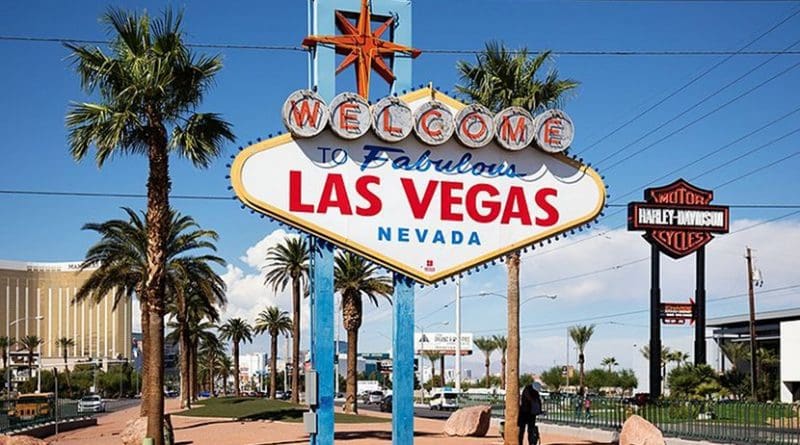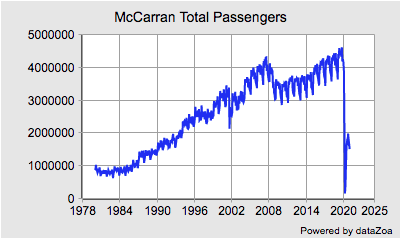Can Las Vegas Recover From Covid? – OpEd
By MISES
By Doug French*
The Clark County Commissioners voted recently to rename McCarran Airport to Harry Reid International Airport. The vote was unanimous among those who rule the Las Vegas Strip. The public doesn’t understand why Las Vegas International Airport wouldn’t do if McCarran’s past is so perturbing. Not everyone is so wild about Harry.
There was a time when 40 million plus visitors passed through McCarran, during the boom years. But January 2021 saw visitor traffic fall 64 percent from a year ago. This sort of traffic has The Motley Fool wondering, “Are There Too Many Casinos in Las Vegas?” After all, convention traffic is nil, and “[a] concrete industry convention this summer is seen as the first real test of whether Las Vegas can come back soon,” writes Rich Dumprey.
These days the convention center is housing covid vaccinations. The creator of the Las Vegas convention industry, Sheldon Adelson (SGA), just passed away, and had lined up a sale of all Las Vegas Sands properties before his death. LVS is all about Macau, Singapore and … Texas? That’s right, Sands money flooded into Austin in hopes of moving the legalized gaming needle, and convention business, in LVS’s direction.
What did SGA see that the rest of the town didn’t and doesn’t? As the Fool explains, “There are around 30 casinos on the Las Vegas Strip, about two dozen more nearby (such as on Fremont Street), and dozens more elsewhere. Yet with so many gambling halls available and so few people to fill them, casino operators could delay their recovery by continuing to operate them all. Perhaps the new normal for Vegas should be fewer casinos.”
As for convection space, in a piece for mises.org, I wrote, “Las Vegas convention attendance first topped 6 million in the boom year of 2005. Since then, the number of yearly convention visitors has bounced between just short of 4.5 million in 2009 and again in 2010 … ” In 2019, 6.6 million conventoineers hit town, while in 2020 let’s just say very few arrived.
Meanwhile, the Las Vegas Convention Authority has added “1.4 million square feet to its facility, including six hundred thousand square feet of new leasable exhibit space,” supposedly because, as LVCVA chief Steve Hill said in 2019, “It’s pretty remarkable what’s going on in Las Vegas right now, but it’s in response to demand.”
Elon Musk finished an underground people mover at the LVCVA site and has been signed on to dig more tunnels.
So, SGA saw thousands of rooms to compete with and the government (LVCVA) continuing to compete with subsidized rates for conventions. You see, hotels pay the LVCVA fees to bring business to Las Vegas and with those fees are able to offer lower convention space rates. Texas doesn’t sound so crazy after all.
As for Harry’s airport, one wonders when folks will want to fill the friendly skies again. The New York Times’s Farhad Manjoo writes, “Face-to-face interactions were said to justify the $1.4 trillion spent globally on business travel in 2019. In 2020, business travel was slashed in half, our faces were stuck in screens, and yet many of the companies used to spending boatloads on travel are doing just fine.”
Manjoo gives plenty of space to the carbon footprint of the average business traveler, but, more importantly, he interviewed Darren Marble, an entrepreneur based in Los Angeles, who learned face-to-face is not all it’s cracked up to be. “Rapport is overrated,” Marble told Manjoo.
And while I may think having a carbon-neutral footprint is overrated, younger folks put it much higher on their preference scales. The Global Business Travel Association predicts business travel will return to 2019 levels by 2025.
For Las Vegas and Reid International, 2025 won’t be soon enough.
*About the author: Douglas French is former president of the Mises Institute, author of Early Speculative Bubbles & Increases in the Money Supply, and author of Walk Away: The Rise and Fall of the Home-Ownership Myth. He received his master’s degree in economics from UNLV, studying under both Professor Murray Rothbard and Professor Hans-Hermann Hoppe.
Source: This article was published by the MISES Institute


